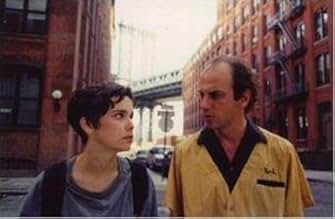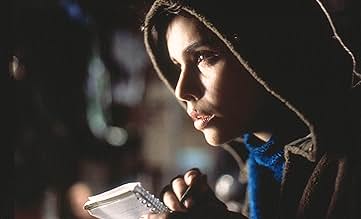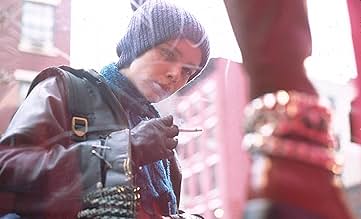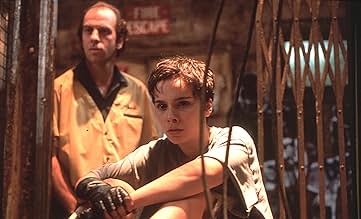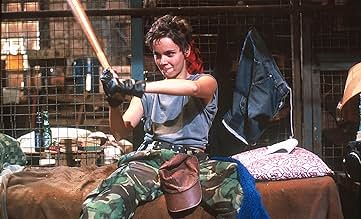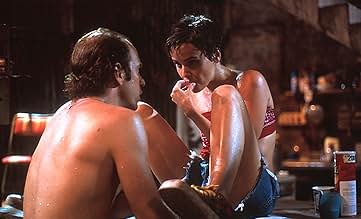Füge eine Handlung in deiner Sprache hinzuPaco and Tonho are illegal Brazilian immigrants in New York. Shy Tonho dreams of being successful, but misses his family and Brazil. Pursued by Immigration Service and later arrested, he is ... Alles lesenPaco and Tonho are illegal Brazilian immigrants in New York. Shy Tonho dreams of being successful, but misses his family and Brazil. Pursued by Immigration Service and later arrested, he is about to be deported. Paco, a rapper and performer, indifferent to all except her career, ... Alles lesenPaco and Tonho are illegal Brazilian immigrants in New York. Shy Tonho dreams of being successful, but misses his family and Brazil. Pursued by Immigration Service and later arrested, he is about to be deported. Paco, a rapper and performer, indifferent to all except her career, dreams of hitting the top ten chart. The film shows the relationship of the couple in love... Alles lesen
- Regie
- Drehbuch
- Hauptbesetzung
- Auszeichnungen
- 9 Gewinne & 5 Nominierungen insgesamt
Empfohlene Bewertungen
This movie is based on a play of the celebrated Brazilian author Plínio Marcos, he wrote more than 40 plays as well as novels and short stories. Plínio had a problem with the censors and was jailed several times because of his writing. He had abandoned school unable to cope with the pressure from his teacher who forced him to write with his right hand even though he was left-handed. The author was often confused with the characters he created and the image he himself portrayed in interviews.
Very good adaptation to the cinema by Brazilian director José Joffily.
In an abandoned warehouse in New York, Tonho (Roberto Bomtempo) and Paco (Débora Falabella) meet to reevaluate their conditions. In common, the fact that they are Brazilians, are abroad illegally and in pursuit of their ambitions. Tonho is silly, naive, small, and hides his condition from the family, which remains in Brazil, through illusory letters that report a utopian present, in which everything worked out. It's the way he found to deceive not only the only people who care about him, but also to deceive himself, since he's the first to consider himself, first and foremost, a failure, ready to give up everything to go back to House.
Paco, in turn, is daring, marked by life and based on trickery. He disguises himself as a boy to pass himself off as a call boy at bus stations and subway stations, where he makes a living through the change he receives for performing oral sex on men in a hurry in public bathrooms. When the masks they hold so hard fall away, regret and frustration remain, feelings that will learn to work together.
Joffily's filmic work departs from the original dramatic structure of the play by Plínio Marcos, but proposes a reinterpretation of it, modifying characters and setting, in a process of transcreation that allows the contemporary spectator a critical and social discussion, overcoming and deepening the mark of pure or mere entertainment. Seeking to address the world we live in and not an imaginary world. An influence of Bertolt Brecht's aesthetic propositions on the filmic work is pointed out, when discussing contemporary social themes that allow the spectator an important critical distance for a process of social reflection. Characteristic that overlaps the structure of the film with a discussion about fictional narrative and documentary narrative. Bill Nichols in his book entitled "Introduction to documentary" deeply discusses this theme, demonstrating that the differences between the two genres do not guarantee an absolute separation.
Based on the filmic product and the analysis of the filming script in conflict with the original text, major changes that characterize the transcreation process are pointed out, with structural alterations that show that the film does not result in a simple adaptation of the original text. The setting of the text for the city of New York in the United States makes possible a contemporary discussion about the problems of Brazilian immigrants in search of the "American dream", a condition that allows the viewer to critically reflect on our country. The recreation of the character Paco, now presented as a woman, Rita, opens the way for a discussion on gender and interpersonal relationships.
This is how the character of Plínio Marcos' work is shown. With a great power to place its characters under an oppressive and exploitative environment, strong enough to make them reach the ultimate consequences in the results of their human relationships, managing to discuss social and political issues with psychological and subjective issues of a human relationship. . In this line, the cinematographic resources for presenting the filmic product are not only necessary, but also become an important tool that, when well used, will provide not only the identification of the public, but also the relationship that it makes of the artistic work with its daily life. . Producing a product that not only serves as an artistic object representing a thought in a given time and place, but also carries intrinsically the character of being able to be a transforming source of human beings and, through them, the transformation of society. Thus ensuring an enrichment in the production of the work, safeguarding characteristics that go beyond mere entertainment.
Paulo Halm makes use of this resource and the script shows us different locations, which help to understand how this relationship between the concrete (social and historical) and the subjective (imaginary or symbolic field) of each character takes place. Thus, the new guise is established and promotes the public's critical reflection with the remodeled object and rises to transcreation. The film promotes a new discourse, arising from the unveiling of the initial dramatic situation, no longer hypothetical or lived only in the characters' speeches, but interfering in their intentions that, a posteriori, will come to be part of the action in the audience's imagination, in a forceful way. This dramaturgical option of the screenwriter makes the nomenclature adaptation erroneous because the cinematographic work was not directly adapted from the theatrical play, but transcreated from narrative interfaces.
The screenwriter created his cinematographic version proposing a dialogue between the different languages and interfering in the structure of the theatrical dramaturgical work. Previously spent entirely in Brazil, in a fifth-rate stable in a big city, with a market with the potential to generate the dream of improving life for the less affluent layers of neighboring places, but which, in contrast, produces exploitation and discrimination between other elements, which generate social and human ills. Relating, thus, the fictional artistic object with the commitment that one must have with reality for the relationship of identification or critical reflection that the public will make during the presentation.
The point of convergence between the scenic, theatrical and cinematographic narratives analyzed here is directly related to Plínio Marcos' aesthetic proposal of going deep with his characters. Present in the outcomes and in the elements that surround the narrative, which is the context in which it is expressed. Taken to the scene to deepen the intrinsic social discussion in the primary objective of the dramaturgy, in the style of the author and in the voice of the film. Thus, the filmic work shows itself as transcreation because it brings in the creative process characteristics that renew the existing object and prepare new images that are revealing of the concrete (the context in which they are realized) and the subjective (psychic). Following the line of realism, and this is taken to the extreme, in its events, proposals by Plínio Marcos. These possibilities and verisimilitudes generate the public's identification and the conflict leads to the psychological drama contained in existing human and social relations, that is, mutual knowledge and recognition is considerably subjectivist to the audience and contributes to walking along with the tension of the plot.
Finished on digital equipment, this image clarity is easily perceived on stage. Filmed in São Paulo (internal) and in New York (external), it is an example of an international co-production that knew how to present a beautiful work even with few resources, an example to be followed in our cinematography. Despite this, it lacks energy, and what we see is actually a filmed play rather than a film in its own right. The transposition from one medium to the other did not take place completely, which ends up hampering its acceptance a little.
With regard to the aesthetic correspondences, a creative dialogue between the screenwriter/filmmaker and the playwright Plínio Marcos is perceived, in a lyrical rescue, where the love and hate relationships between the characters are discussed, in a contemporary reinterpretation where gender issues are inserted in questions relevant social. These experiences have been teaching us some possible paths between literature and cinema. And it is in this dialogue that paradoxical and complementary elements such as subjectivity and objectivity, pleasure and criticism, unveil social and psychological issues, expanding the discussion in the constitutive narrative interfaces of different languages, theater and cinema becoming an important tool in the commitment that must be had with the conscious management of the work of art and its aesthetic and ideological trends.
With cutting dialogues, typical of Plínio Marcos, Joffily sets up an intimate scenario of resounding disillusionment, centered on the abandoned apartment that the duo share. The 5th avenue and the Broadway region, without glamour, do not hide the failure of those who, targets of prejudice and lack of opportunities, head from one side to the other with still a shred of expectation.
If there is any slippage in Joffily's version - the second made to the cinema, after an attempt by Braz Chediak, in 1971 -, it is the predominance, at times, of a vestige of theatricality in the dialogues. Débora Falabella gives a performance worthy of the award she received at the Festival de Brasília, but ends up overloaded, since the text retains much of this prolixity. On screen, the situation calls for more atmosphere, less vehemence... By itself, without needing reinforcement, the situation experienced by the characters is already frighteningly tragic.
Wusstest du schon
- WissenswertesIn this film Débora Falabella plays a scene in which she appears completely naked, with a gun pointed in her direction. At Playboy Brasil, Falabella said, "What made it easier in that scene was the fact that I had to feel afraid and fragile. So being naked helped me in that composition. But of course the scene is uncomfortable, I'm not as comfortable naked as if I were dressed."
- VerbindungenVersion of Dois Perdidos numa Noite Suja (1971)
Top-Auswahl
Details
Box Office
- Budget
- 176.541 R$ (geschätzt)
- Laufzeit
- 1 Std. 40 Min.(100 min)
- Farbe

